Renowned Mozambican actress, Lucrecia Paco visits the Aga Khan Academy Maputo
Adilia Cabral: Standing Up for Inclusiveness and Respect in Classrooms
Throughout the course of her teaching journey, Adilia Cabral has valued the importance of inclusivity in creating an engaging and fruitful environment in the classroom. She shares details of her evolution during her time at Aga Khan Academy Maputo.
For the Aga Khan Academy Maputo teacher, Adilia Denise Aly Guedes Evaristo Cabral, mutual trust between teachers and students, as well as between students themselves, is of paramount importance for a thriving classroom. It is a crucial factor for any successful learning experience. And how does Adilia ensure this flourishing environment persists in her classroom in Maputo, Mozambique? By supporting students and ensuring they support and respect each other.
“I teach with love because I want to gain the trust and friendship of students. I am always available to listen to them and I want them to feel comfortable sharing their problems with me. I always try to look students in the eye and read their body language, because that's what dictates how I should react with a particular student that day,” she says, adding, “I also make sure there is a spirit of cooperation between students in the classroom.”
Listening to Adilia and the details of her background, education and experience, one feels she chose the perfect career for herself.
“When I was a young student in school, one of my aunts, who was an educator herself, told me that I should follow the teaching profession because she saw I had a passion for that calling. I am glad I listened to her. I love to teach and want to inspire and empower my students to excel in whatever they choose to do.”
Adilia was born in Mozambique in the province of Beira. She has a degree in French teaching from the Pedagogical University in Maputo, Mozambique. After graduating in 2004, she taught in private schools around the cities of Maputo and Matola. She joined the Academy in 2017 where she teaches French Language Acquisition and Portuguese Language and Literature.
The Academy’s International Baccalaureate (IB) curriculum is interwoven with the rich Aga Khan Curricular Strands of ethics, pluralism, economics for development, cultures, governance and civil society. These play a vital role in Adilia’s instruction as she incorporates them in her lessons.
“One way to ensure that in a pluralistic environment there is no discrimination or bullying is to make students respect each other regardless of colour, race or background. This is an aspect that is always reinforced within the Academy through the Aga Khan Academies' Learner Profile, in the classrooms and the way our units are designed.”
Making certain students respect each other and work together is important to Adilia. But so is independent learning. As she explains, “During my class, I prioritise teamwork, group work and peer work as well. All students must respect each other regardless of disagreements. As for training small leaders, the activities are designed so that each student takes action in the units. I always give students opportunities to become independent and look for solutions to overcome problems and obstacles. In my classes, each student contributes to the success of the group.”
Joining the Academy has been a transformative journey for Adilia. It has helped her in her personal and professional growth and has made it possible for her to become a more effective educator.
“The Academy has made me a better instructor by giving me feedback on my teaching,” she states and adds, “also, the institution offers ongoing training courses to make teachers more effective and more successful.”
Reflecting on her time at the institution, Adilia says a day that was especially rewarding and memorable for her was the day she graduated from the Academy’s Teachers Preparation Programme (TPP).
“I felt special,” she recounts with pride. “I felt recognised for what I was doing and it made me aware of how important the training was and how important the teaching profession was. The Academy was placing great trust in me. And I had to work hard for not only for myself, but for my students and for my country. That day was the beginning and not the end of a long journey.”
Newsletter Subscription
Click here to subscribe to the Aga Khan Academies newsletter
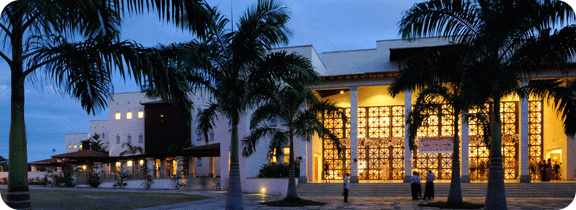
History
In 2000, His Highness the Aga Khan initiated a programme to establish an integrated network of schools, known as Aga Khan Academies. The aim of the Academies is to provide education to deserving students at an international standard of excellence.
The Aga Khan Academies are part of the Aga Khan Development Network (AKDN), which has been involved in education in developing countries for decades. AKDN agencies currently run more than 240 schools and educational programmes ranging from early childhood through to post-graduate education.
Establishment of the Aga Khan Academy Mombasa
In 2003, the first of the Aga Khan Academies was established in the Kizingo area of Mombasa, Kenya. The Aga Khan Academy Mombasa is a state-of-the-art learning institution recognised as an International Baccalaureate World School.
The campus design was inspired by Swahili architecture. Our campus sits on an 18-acre piece of land that includes a residential facility, a sports complex, classrooms, resources areas and common areas.
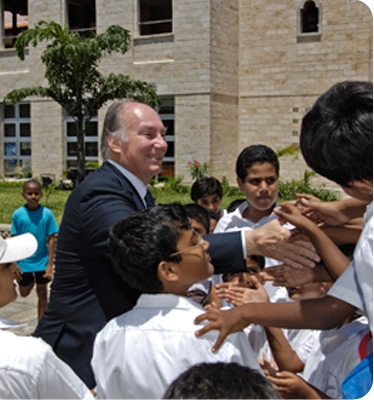 The Academy was inaugurated in 2003 as a day school by His Excellency Mwai Kibaki, the President of Kenya, in the presence of His Highness the Aga Khan. The residential programme officially began in April 2009.
The Academy was inaugurated in 2003 as a day school by His Excellency Mwai Kibaki, the President of Kenya, in the presence of His Highness the Aga Khan. The residential programme officially began in April 2009.
His Highness the Aga Khan visits the Academy in Mombasa
We pride ourselves on having a multicultural student body, which excels not only in academic pursuits, but also in sports, cultural activities and community initiatives. Our programme has already proved successful, with our students achieving strong academic results. In 2007, we saw our first International Baccalaureate Diploma graduates obtain acceptance as well as scholarships from top post-secondary institutions worldwide.
The Academies network
The Aga Khan Academy Mombasa will be part of a network of approximately 18 planned Aga Khan Academies that will form an interconnected learning community.
The Aga Khan Academy Hyderabad, India was the second to open in 2011, and the third opened in 2013 in Maputo, Mozambique. Others are at various stages of planning and development (map).
The work of the Academies is also enhanced through partnerships with other international educational institutions. These include the International Baccalaureate network, the Aga Khan University, the University of Central Asia and other agencies of the Aga Khan Development Network.
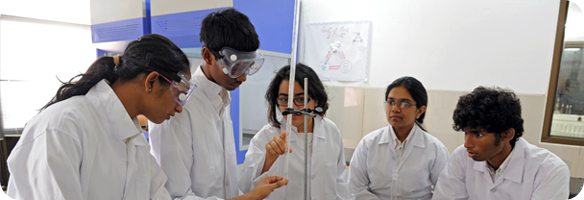
Academic Programme
The Aga Khan Academy Dhaka offers an education of an internationally recognised standard of excellence to prepare students to become intellectually curious, globally-minded citizens of the world.
The Academy programme develops students who are committed to positive change and are able to understand and analyse complex issues of local, national and global significance.
Our curriculum is rigorous and multidisciplinary, fostering:
- intellectual curiosity
- creativity
- leadership development
- social consciousness
- a pluralistic sensibility.
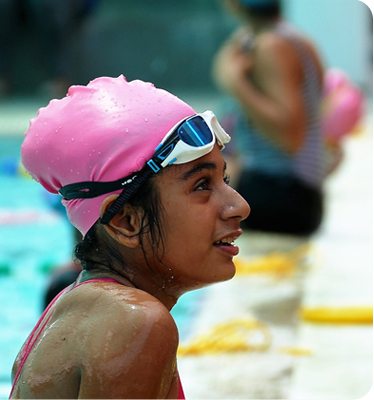 We prepare students for admission to the best universities in their own countries and abroad.
We prepare students for admission to the best universities in their own countries and abroad.
Our focus is on developing students' critical thinking skills and the ability to analyse issues. We also emphasise multicultural understanding and awareness. One of the ways in which we help our students develop skills for ethical leadership is through the Aga Khan Curricular Strands. These are cross-disciplinary areas of study that have been developed for the network of Aga Khan Academies.
Overall educational programme
Our curriculum is complemented by enrichment, athletic and community service initiatives. The overall educational programme is designed to educate well-rounded, civic-minded individuals. It enhances students’ academic excellence, leadership skills, sense of civic responsibility, understanding of global issues, and analytical and study skills. The programme also reinforces an understanding of local languages, history, cultures and environment.
When they graduate from the Academy, students are expected to be computer literate and have a thorough understanding of a diverse range of academic disciplines. They should have mastered at least two languages, including English. Through the planned international exchange programme, our students will be able to enhance their foreign language learning and appreciation of other cultures.
Our graduates are thus well prepared for the rigours of higher education and to pursue opportunities in an increasingly interdependent world.
For further information on the programmes offered at the Aga Khan Academy Dhaka, please visit the following pages:
- Primary Years (Grades 1–5)
- Middle Years (Grades 6–10)
- Diploma Programme (Grades 11–12).
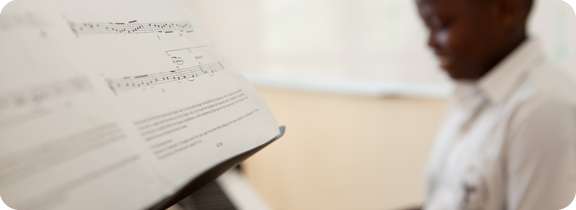
Co-curricular Programmes
Co-curricular programmes enable students to realise their potential in a variety of settings beyond the classroom. Students develop a sense of self-awareness and an understanding of school and community needs and opportunities. They also learn how to apply their gifts and skills to make a positive impact.
At the Academy, we believe in a balanced, rounded, comprehensive school experience. As this includes both academic and co-curricular experiences, we encourage our students to do their best both in and outside the classroom.
We will offer outstanding sports facilities that will include:
- swimming and diving pools
- cricket, soccer and hockey pitches
- basketball and volleyball areas
- tennis and squash courts
- dance studio
- gymnasium
- athletics tracks.
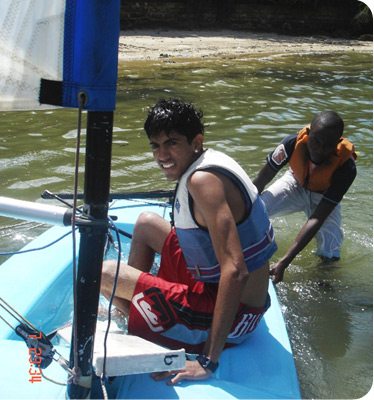 Children with special sporting gifts will be encouraged to develop their talents in every way. Children with special gifts in music, art or drama will similarly be encouraged through opportunities to practise and perform while at the Academy.
Children with special sporting gifts will be encouraged to develop their talents in every way. Children with special gifts in music, art or drama will similarly be encouraged through opportunities to practise and perform while at the Academy.
Our co-curricular programmes are clustered into three main streams, each with a different focus:
Creative Expression
Whether through visual or performing arts, this cluster engages students to think creatively and express their identities and thoughts aesthetically. Through theatre, art, music and drama, students learn to work together and infuse their projects with values and lessons from other parts of their schooling. Individual and collaborative creative projects emphasise growth and development through personal challenge, ultimately resulting in achievable personal goals.
Action
The student as a reflective practitioner is a basic tenet of the Action cluster. Through physical sport—both competitive and non-competitive—students are challenged in their physical growth, and learn values such as good sportsmanship, teamwork and ethical behaviour. We encourage them to extend themselves by trying different activities and working with teammates to pass on their knowledge. In line with developing the student as a whole, a healthy lifestyle complements and enhances academic achievement.
The Academies will be concerned with the whole of the human being—mind, body and spirit—and with the broad range of human aspiration—intellectual, moral, artistic, physical and spiritual. The fact that these are residential academies will contribute enormously to these broad objectives, encouraging students to identify more completely with the school, to help lead it and shape its environment.
The Academies will be concerned with the whole of the human being—mind, body and spirit—and with the broad range of human aspiration—intellectual, moral, artistic, physical and spiritual. The fact that these are residential academies will contribute enormously to these broad objectives, encouraging students to identify more completely with the school, to help lead it and shape its environment.
Citizenship
At the Academy, we encourage knowledge and understanding of humanity and civil society. Through their involvement in citizenship activities, students gain an understanding of the practical implications of their work and study. By collaborating with community groups on sustainable projects, they develop an appreciation for human rights and human dignity, and of how their actions impact the world around them.
To learn more about the Academy's programme, please visit the Academic Programme page.
Public holiday
End of term break
The Aga Khan Academy Maputo will be closed on 19 December 2022, with classes resuming in January 2023.

